2017届高考外研版英语二轮复习:语法专题8 情态动词
文档属性
| 名称 | 2017届高考外研版英语二轮复习:语法专题8 情态动词 |  | |
| 格式 | zip | ||
| 文件大小 | 149.7KB | ||
| 资源类型 | 教案 | ||
| 版本资源 | 外研版 | ||
| 科目 | 英语 | ||
| 更新时间 | 2016-12-19 16:42:46 | ||
图片预览

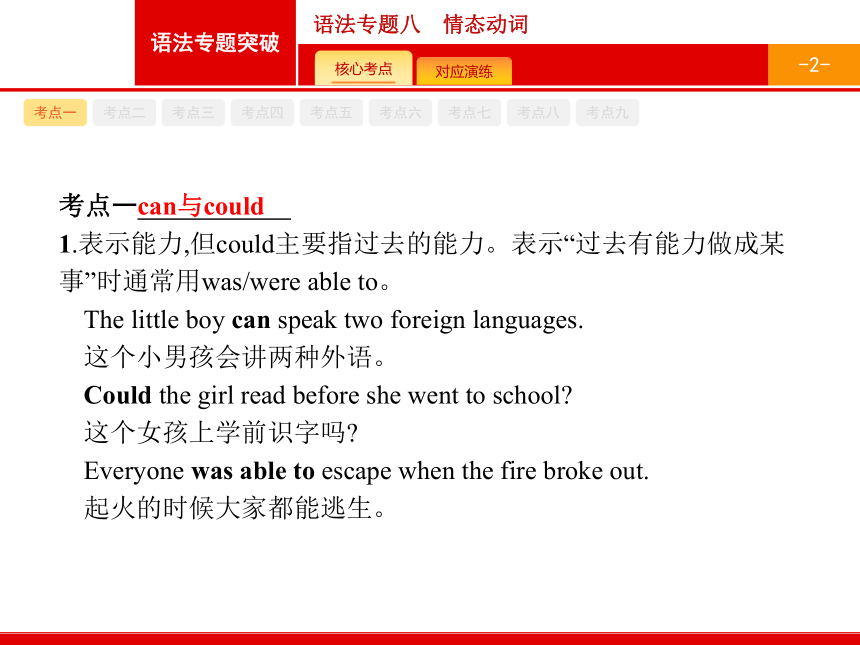

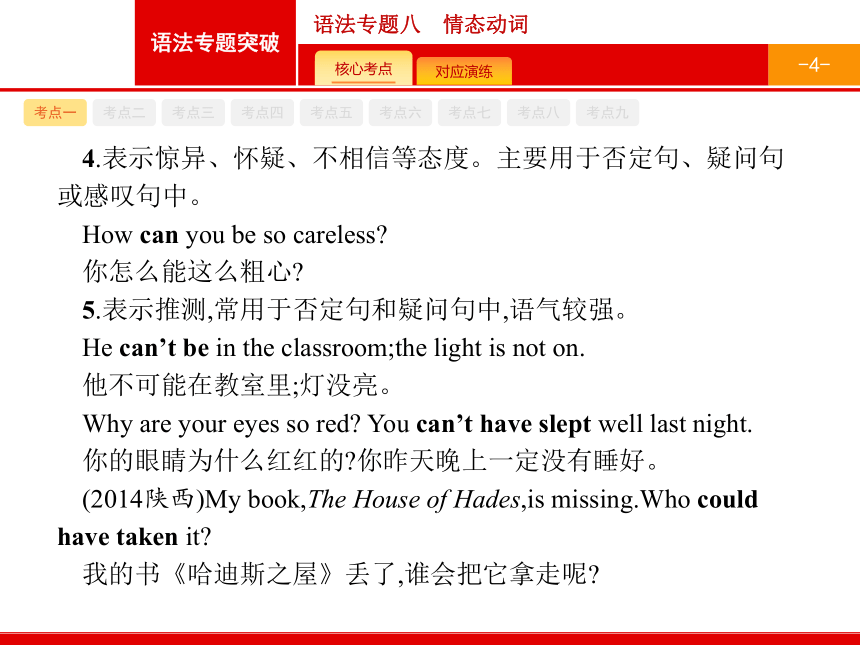
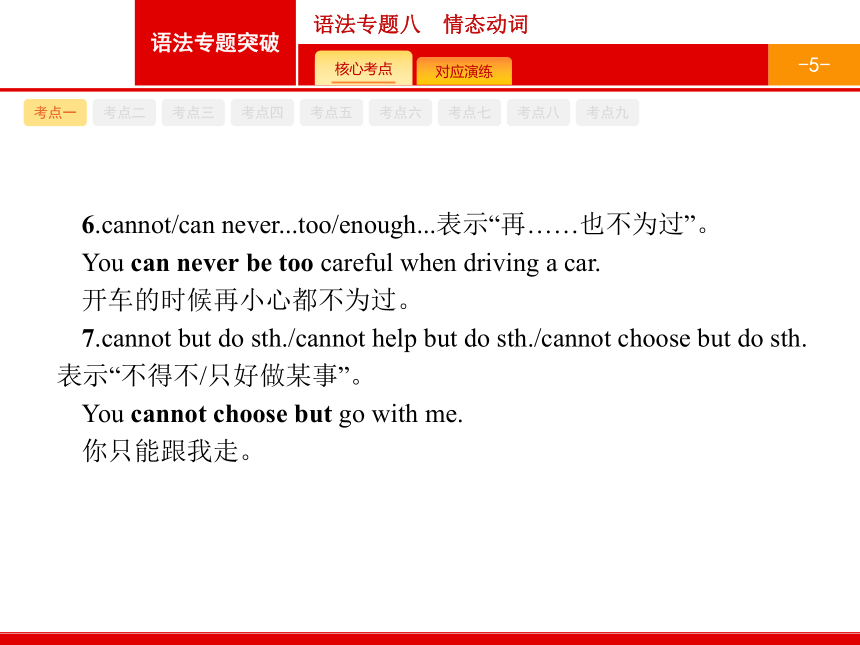
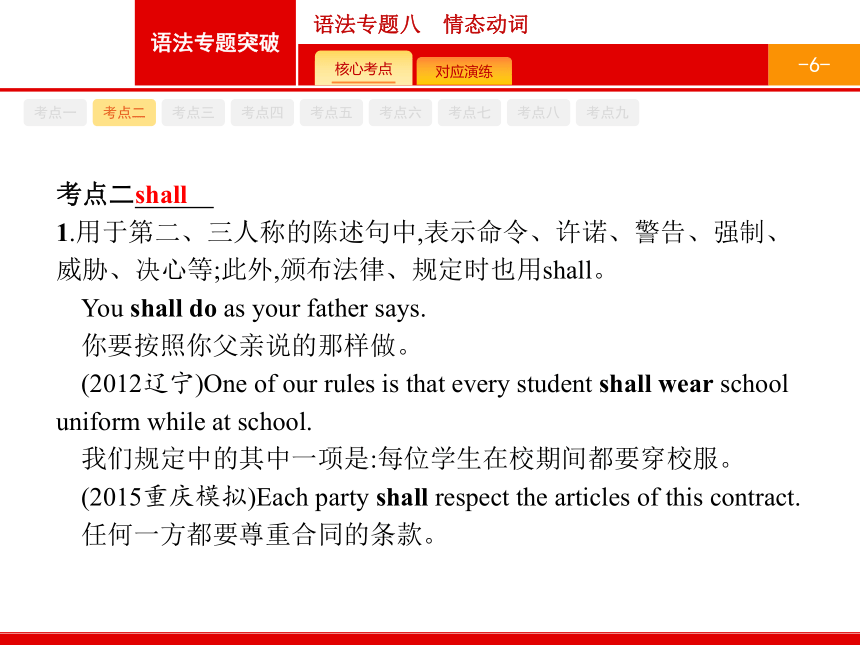
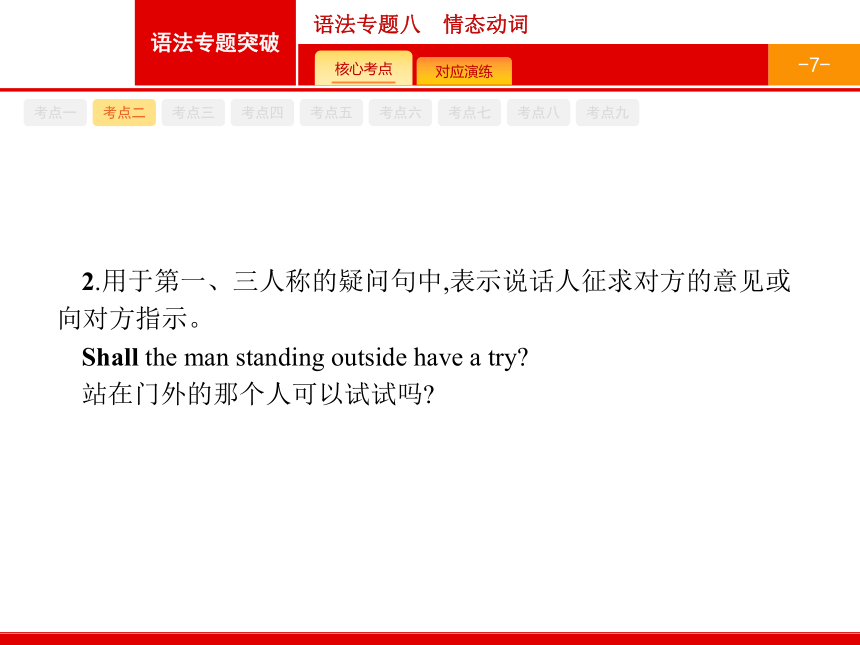
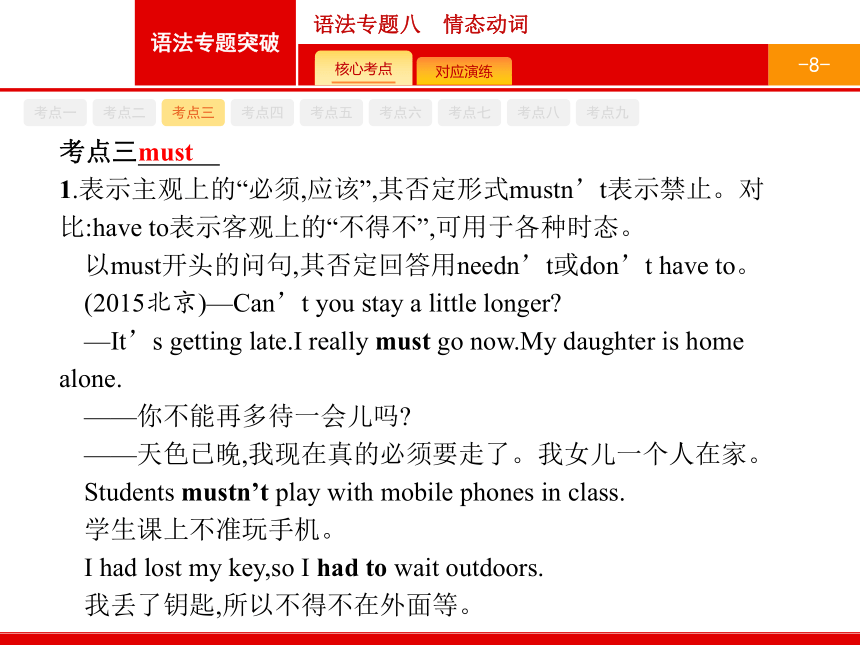
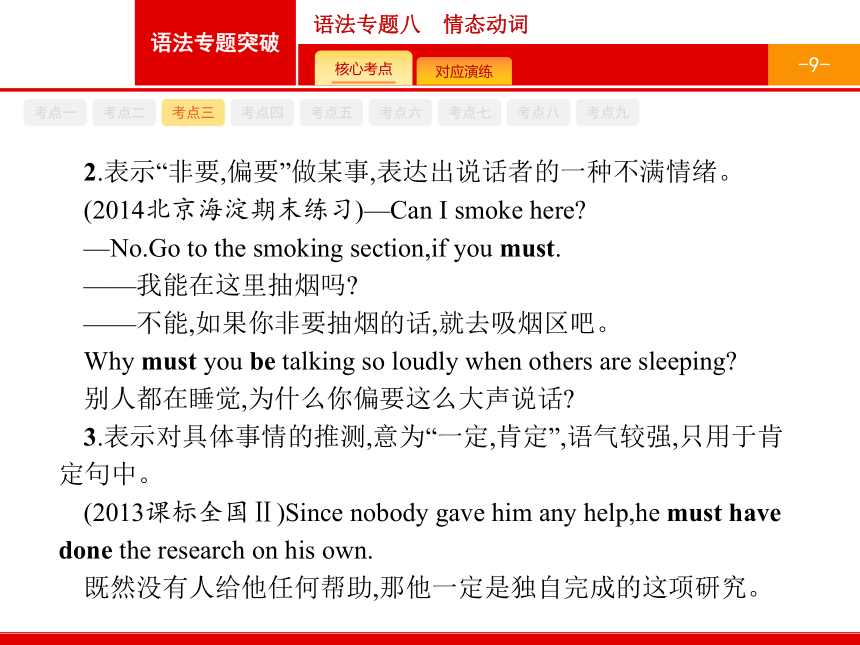
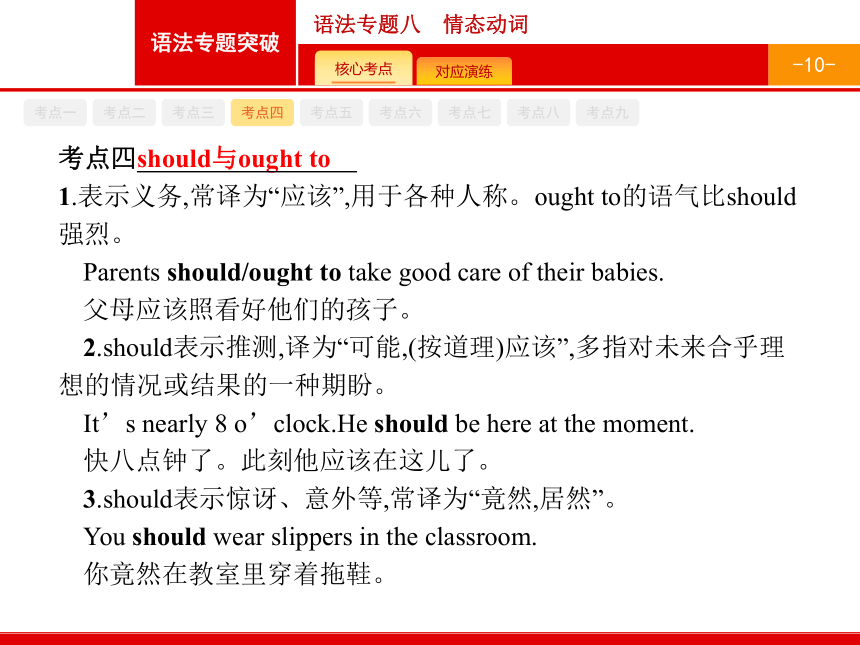
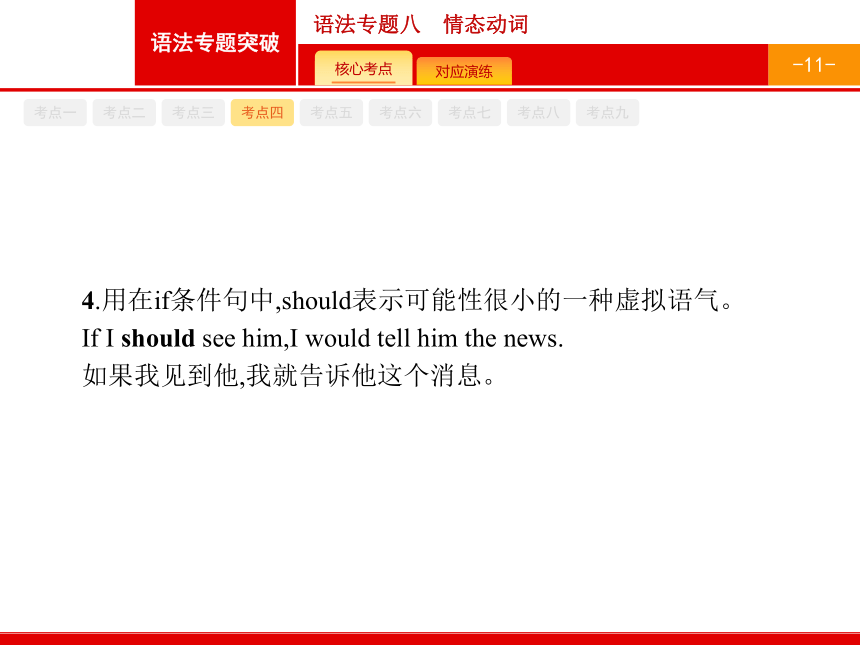

文档简介
课件31张PPT。语法专题八 情态动词-2-考点一考点二考点三考点四考点五考点六考点七考点八考点九考点一can与could ?
1.表示能力,但could主要指过去的能力。表示“过去有能力做成某事”时通常用was/were able to。
The little boy can speak two foreign languages.
这个小男孩会讲两种外语。
Could the girl read before she went to school?
这个女孩上学前识字吗?
Everyone was able to escape when the fire broke out.
起火的时候大家都能逃生。-3-考点一考点二考点三考点四考点五考点六考点七考点八考点九2.表示可能(理论上或是逻辑判断上,并不涉及此事真的发生),常译为“往往会,有时候可能会”,常用于肯定句中。
(2014大纲全国)Although you can find bargains in London,it’s not generally a cheap place to shop.
虽然你有可能在伦敦买到便宜的东西,但通常而言这不是个买便宜东西的地方。
3.表示请求和允许。在问句中could语气比can要委婉。
(2014北京)Can I have a word with you? It won’t take long.
我能和你说会话吗?不会占用你很长时间。
You can go back home now.
你现在可以回家了。-4-考点一考点二考点三考点四考点五考点六考点七考点八考点九4.表示惊异、怀疑、不相信等态度。主要用于否定句、疑问句或感叹句中。
How can you be so careless?
你怎么能这么粗心?
5.表示推测,常用于否定句和疑问句中,语气较强。
He can’t be in the classroom;the light is not on.
他不可能在教室里;灯没亮。
Why are your eyes so red? You can’t have slept well last night.
你的眼睛为什么红红的?你昨天晚上一定没有睡好。
(2014陕西)My book,The House of Hades,is missing.Who could have taken it?
我的书《哈迪斯之屋》丢了,谁会把它拿走呢?-5-考点一考点二考点三考点四考点五考点六考点七考点八考点九6.cannot/can never...too/enough...表示“再……也不为过”。
You can never be too careful when driving a car.
开车的时候再小心都不为过。
7.cannot but do sth./cannot help but do sth./cannot choose but do sth.表示“不得不/只好做某事”。
You cannot choose but go with me.
你只能跟我走。-6-考点一考点二考点三考点四考点五考点六考点七考点八考点九考点二shall ?
1.用于第二、三人称的陈述句中,表示命令、许诺、警告、强制、威胁、决心等;此外,颁布法律、规定时也用shall。
You shall do as your father says.
你要按照你父亲说的那样做。
(2012辽宁)One of our rules is that every student shall wear school uniform while at school.
我们规定中的其中一项是:每位学生在校期间都要穿校服。
(2015重庆模拟)Each party shall respect the articles of this contract.
任何一方都要尊重合同的条款。-7-考点一考点二考点三考点四考点五考点六考点七考点八考点九2.用于第一、三人称的疑问句中,表示说话人征求对方的意见或向对方指示。
Shall the man standing outside have a try?
站在门外的那个人可以试试吗?-8-考点一考点二考点三考点四考点五考点六考点七考点八考点九考点三must ?
1.表示主观上的“必须,应该”,其否定形式mustn’t表示禁止。对比:have to表示客观上的“不得不”,可用于各种时态。
以must开头的问句,其否定回答用needn’t或don’t have to。
(2015北京)—Can’t you stay a little longer?
—It’s getting late.I really must go now.My daughter is home alone.
——你不能再多待一会儿吗?
——天色已晚,我现在真的必须要走了。我女儿一个人在家。
Students mustn’t play with mobile phones in class.
学生课上不准玩手机。
I had lost my key,so I had to wait outdoors.
我丢了钥匙,所以不得不在外面等。-9-考点一考点二考点三考点四考点五考点六考点七考点八考点九2.表示“非要,偏要”做某事,表达出说话者的一种不满情绪。
(2014北京海淀期末练习)—Can I smoke here?
—No.Go to the smoking section,if you must.
——我能在这里抽烟吗?
——不能,如果你非要抽烟的话,就去吸烟区吧。
Why must you be talking so loudly when others are sleeping?
别人都在睡觉,为什么你偏要这么大声说话?
3.表示对具体事情的推测,意为“一定,肯定”,语气较强,只用于肯定句中。
(2013课标全国Ⅱ)Since nobody gave him any help,he must have done the research on his own.
既然没有人给他任何帮助,那他一定是独自完成的这项研究。-10-考点一考点二考点三考点四考点五考点六考点七考点八考点九考点四should与ought to ?
1.表示义务,常译为“应该”,用于各种人称。ought to的语气比should强烈。
Parents should/ought to take good care of their babies.
父母应该照看好他们的孩子。
2.should表示推测,译为“可能,(按道理)应该”,多指对未来合乎理想的情况或结果的一种期盼。
It’s nearly 8 o’clock.He should be here at the moment.
快八点钟了。此刻他应该在这儿了。
3.should表示惊讶、意外等,常译为“竟然,居然”。
You should wear slippers in the classroom.
你竟然在教室里穿着拖鞋。-11-考点一考点二考点三考点四考点五考点六考点七考点八考点九4.用在if条件句中,should表示可能性很小的一种虚拟语气。
If I should see him,I would tell him the news.
如果我见到他,我就告诉他这个消息。-12-考点一考点二考点三考点四考点五考点六考点七考点八考点九考点五will与would ?
1.表示意愿,用于各种人称的陈述句中。would常指过去的意愿。
If you will read the book,I’ll give it to you.
如果你愿意读这本书,我就给你。
2.表示请求、建议,常用于第二人称,用在疑问句中。would语气较委婉。
Will you please close the window?
请你关上窗户好吗?-13-3.表示某种倾向或习惯性动作,常译为“总是,惯于”。would 可表示过去反复发生的动作或某种倾向,后面接表示动作的动词,不能接表示状态的词。对比:used to表示过去的习惯动作或状态,强调现在已不存在。
(2013课标全国Ⅰ)The door wouldn’t open,no matter how hard she pushed.
无论她怎么用力推,这扇门就是打不开。
(2014四川)I still remember my happy childhood when my mother would take me to Disneyland at weekends.
我仍然记得快乐的童年,那时妈妈经常在周末带我去迪斯尼乐园。考点一考点二考点三考点四考点五考点六考点七考点八考点九-14-考点一考点二考点三考点四考点五考点六考点七考点八考点九考点六may与might ?
1.表示请求、允许、许可,might比may语气委婉。
You may use my bike.
你可以用我的自行车。
2.表示推测,常用于陈述句中,语气比较弱,把握性不大。might语气比may还要弱。
Life is unpredictable;even the poorest might/may become the richest.
生活是不可预测的,甚至是最穷的人也可能会变成最富的。
3.may/might as well+动词原形,意为“最好,倒不如……”。
You may/might as well do it at once.
你最好立刻开始做。-15-考点一考点二考点三考点四考点五考点六考点七考点八考点九4.may well+动词原形,意为“完全能,很可能”。
He may well be late for class.
他上课很可能迟到。
5.may用于祈使句中,表示祝愿。
May you return in safety.祝你安全归来。-16-考点一考点二考点三考点四考点五考点六考点七考点八考点九考点七need 与dare ?
1.二者都可以作为情态动词和行为动词。当作情态动词时,后面要接动词原形,通常用于否定句、疑问句和条件句中。用作行为动词时,其变化和一般的动词相同,有人称和数的变化,构成否定句和疑问句时要借助于助动词do,does,did。dare用作行为动词,用于否定句和疑问句时,常省略后面的to。
(2014湖南)—I’ve prepared all kinds of food for the picnic.
—Do you mean we needn’t bring anything with us?
——我已经为野餐准备了各种各样的食物。
——你的意思是我们不必带任何东西了?
The little girl didn’t dare(to) go out at night alone.
小女孩晚上不敢独自外出。-17-考点一考点二考点三考点四考点五考点六考点七考点八考点九2.need作行为动词时,若主语为动作的承受者时用谓语动词的主动形式表示被动意义或用不定式的被动形式。
The house needs repairing.=The house needs to be repaired.
这个房子需要维修。
3.I dare say为习惯说法,意为“我想,大概”。
I dare say she dare not speak to her father in this manner.
我想她不敢用这种方式跟他父亲说话。-18-考点一考点二考点三考点四考点五考点六考点七考点八考点九考点八情态动词表推测 ?
1.can,may,must皆可用来表示推测。
(1)在肯定句中都可以用来表示可能性。在含义上must语气最肯定,may表示不太肯定的可能性,而can表示理论上的可能性。
(2)在否定句中只能用cannot/can’t和may not。can’t(不可能)语气比may not(可能不、也许不)更强。
(3)在疑问句中只能用can,不能用may和must。
Accidents can happen on such snowy days.Look,there is some blood on the road;an accident must have happened just now.But it can’t have been Mike,for I saw him in the school.
这样的下雪天可能会发生事故。看,公路上有血;刚才一定发生事故了。但肯定不是迈克,因为我看见他在学校里。-19-考点一考点二考点三考点四考点五考点六考点七考点八考点九2.should 与ought to 可以表示对未来情况的一种期盼,常译为“按理应当”。
He should/ought to be here on time—he started early.
他应该能按时到达这儿——他很早就出发了。-20-考点一考点二考点三考点四考点五考点六考点七考点八考点九考点九情态动词+have done ?
1.could have done的疑问或否定形式表示对过去发生的行为表示怀疑或不肯定,其中couldn’t have done 多用于语气强烈的否定,意为“过去不可能做过”。could have done在肯定句中表示“本来能做但却没做”。
The accident could have been avoided;the driver couldn’t have slowed down.
这事故本来是可以避免的;司机肯定没减速。
2.may/might have done 表示对过去行为的推测,意为“可能做过”。might 所表示的可能性比较弱,此外might have done 还可表示“本可能做而实际上未做”,含有轻微的责备语气。
You might have given him more help,though you were busy with your work.
你本来可以给他更多的帮助,尽管你工作很忙。-21-考点一考点二考点三考点四考点五考点六考点七考点八考点九3.must have done 表示对过去行为的推测,意为“一定,想必做过”,语气十分肯定。
It must have rained last night,as the ground is wet.
昨晚一定下雨了,因为地面是湿的。
4.should/ought to have done 用于肯定句时,表示“本该做某事而实际上未做”;用于否定句时,则表示“不该做某事反而做了”。
(2015福建)—Sorry,Mum! I failed the job interview again.
—Oh,it’s too bad.You should have made full preparations.
——对不起,妈妈,我这次工作面试又失败了。
——太糟糕了。你本来应该进行充分准备的。 -22-考点一考点二考点三考点四考点五考点六考点七考点八考点九5.needn’t have done表示“本来不必做某事而实际上却做了”。
I actually needn’t have bought so much food—only three people came.
我实际上不必买这么多食物——只有三个人来了。
6.had better have done 用于事后的建议,含轻微责备的口吻,意为“当时最好做了某事”。
I had better have started earlier.
我要是早点起程就好了。-23-考点一考点二考点三考点四考点五考点六考点七考点八考点九7.would rather have done sth.表示“宁愿当时做某事”,其否定形式would rather not have done sth.表达相反的含义,两者都含有“后悔”之意。
I would rather have taken his advice.
我宁愿当时接受了他的建议。
8.would like/love to have done sth.表示“过去愿意做某事但未做成”。
I would love to have gone to the party last night,but I had to work extra hours to finish my report.
我昨天晚上本想去参加聚会来,但我不得不加班写完报告。-24-ⅠⅡⅢⅠ.用合适的情态动词填空
1.(2015重庆改编)You must be Carol.You haven’t changed a bit after all these years.
2.(2015陕西改编)You may feel all the training a waste of time,but I’m a hundred percent sure later you’ll be grateful you did it.?
3.(2015四川改编)You must be careful with the camera.It costs!
4.(2015四川成都二诊改编)Film reviewers are surprised to find that Han Han’s first film,The Continent,should be such a huge success.
5.(2015北京东城下学期综合测试改编)—The fire in the supermarket last night was terrible!
—They should/ought to have taken some measures to prevent it occurring.?解析-25-ⅠⅡⅢ6.(2015安徽淮北二模改编)—What do you think of the report written by Tom?
—The report was based on a careful investigation,so it should be reliable.
7.(2015重庆一中一诊改编)I promise Shirley shall get a new iPad on her birthday.
8.(2015浙江省重点中学协作体适应性测试改编)There shouldn’t be any difficulty about winning the speech contest now that you’re well prepared for it.
9.(2015安徽黄山第二次质检改编)—I’m afraid I have to leave now,for you see,he is waiting for me.
—Well,if you must,at least wait till the heavy rain stops.解析-26-ⅠⅡⅢ10.(2015浙江嘉兴教学测试改编)Everyone present certainly thinks there should be a total ban on cigarette advertising.
11.(2014重庆改编)I’ve ordered some pizza,so we needn’t worry about cooking when we get home tired.?
12.—School is over.How can we contact Robert?
—Try phoning him.He should be home by now.He lives only a stone’s throw from the school.解析-27-ⅠⅡⅢⅡ.用can,may,might,will,would,shall,should或must的适当形式填空
1. Can that be true?I can’t believe my eyes and ears.?
2.—May/Might I have a word with your manager,please?
—Yes,you may.
3.—Must I return all the books in three days?
—Yes,you must.
4.Why must it rain on Sunday?
5.You shall be punished for what you have done.-28-ⅠⅡⅢ6.I think today’s children should really learn to respect their elders.
7.People will die without air or water.
8.When we were children,we would sit around Grandpa after supper,listening to his stories.
9.Would you mind my smoking here?
10.I should have helped him,but I was busy at that time.?-29-ⅠⅡⅢⅢ.用所给单词的正确形式完成下面短文
might may is are should can will would
Lack of parent willpower 1.may contribute more to young people’s obesity than under-exercising or overeating.
Research suggests that having overweight parents 2.is a big influence upon a child’s weight,with one study finding that children with overweight parents 3.are four times more likely to be overweight themselves.
The findings add heat to an already fierce political debate(争论) over childhood obesity.The Prime Minister,John Howard,last week decided that $116 million would be used for programs to deal with obesity,while the Opposition Leader,Mark Latham,recently announced that his party 4. would move to protect children from unhealthy food ads.?-30-ⅠⅡⅢClare Collins,a senior lecturer at the University of Newcastle,believes such programs 5.will definitely fail unless they influence the way of life of whole families.“If we 6.can’t get parents to take action against their own weight problems,then we 7.can’t expect to influence their kids,” she said.
However,Professor Louise Baur from the Children’s Hospital at Westmead,doubts whether adult education programs offer any solution to weight problems.“Many parents know they need to lose weight and they know it influences their kids,but they lack the willpower to do anything about it.”-31-ⅠⅡⅢThe 10-year study of 150 American children found two-thirds of children with overweight parents became overweight.Only one in six children whose parents 8.were of average weight became overweight.
The president of the Australasian Society for the Study of Obesity,Associate Professor Gary Wittert,said parents needed help in doing their job and the Opposition Party’s policy 9.might be on the right track.
“We know that driving without a seat belt is unsafe,so we make law against it,” he said.“Obesity is a major public health concern,so why 10. shouldn’t we change the law regarding unhealthy food ads?”
1.表示能力,但could主要指过去的能力。表示“过去有能力做成某事”时通常用was/were able to。
The little boy can speak two foreign languages.
这个小男孩会讲两种外语。
Could the girl read before she went to school?
这个女孩上学前识字吗?
Everyone was able to escape when the fire broke out.
起火的时候大家都能逃生。-3-考点一考点二考点三考点四考点五考点六考点七考点八考点九2.表示可能(理论上或是逻辑判断上,并不涉及此事真的发生),常译为“往往会,有时候可能会”,常用于肯定句中。
(2014大纲全国)Although you can find bargains in London,it’s not generally a cheap place to shop.
虽然你有可能在伦敦买到便宜的东西,但通常而言这不是个买便宜东西的地方。
3.表示请求和允许。在问句中could语气比can要委婉。
(2014北京)Can I have a word with you? It won’t take long.
我能和你说会话吗?不会占用你很长时间。
You can go back home now.
你现在可以回家了。-4-考点一考点二考点三考点四考点五考点六考点七考点八考点九4.表示惊异、怀疑、不相信等态度。主要用于否定句、疑问句或感叹句中。
How can you be so careless?
你怎么能这么粗心?
5.表示推测,常用于否定句和疑问句中,语气较强。
He can’t be in the classroom;the light is not on.
他不可能在教室里;灯没亮。
Why are your eyes so red? You can’t have slept well last night.
你的眼睛为什么红红的?你昨天晚上一定没有睡好。
(2014陕西)My book,The House of Hades,is missing.Who could have taken it?
我的书《哈迪斯之屋》丢了,谁会把它拿走呢?-5-考点一考点二考点三考点四考点五考点六考点七考点八考点九6.cannot/can never...too/enough...表示“再……也不为过”。
You can never be too careful when driving a car.
开车的时候再小心都不为过。
7.cannot but do sth./cannot help but do sth./cannot choose but do sth.表示“不得不/只好做某事”。
You cannot choose but go with me.
你只能跟我走。-6-考点一考点二考点三考点四考点五考点六考点七考点八考点九考点二shall ?
1.用于第二、三人称的陈述句中,表示命令、许诺、警告、强制、威胁、决心等;此外,颁布法律、规定时也用shall。
You shall do as your father says.
你要按照你父亲说的那样做。
(2012辽宁)One of our rules is that every student shall wear school uniform while at school.
我们规定中的其中一项是:每位学生在校期间都要穿校服。
(2015重庆模拟)Each party shall respect the articles of this contract.
任何一方都要尊重合同的条款。-7-考点一考点二考点三考点四考点五考点六考点七考点八考点九2.用于第一、三人称的疑问句中,表示说话人征求对方的意见或向对方指示。
Shall the man standing outside have a try?
站在门外的那个人可以试试吗?-8-考点一考点二考点三考点四考点五考点六考点七考点八考点九考点三must ?
1.表示主观上的“必须,应该”,其否定形式mustn’t表示禁止。对比:have to表示客观上的“不得不”,可用于各种时态。
以must开头的问句,其否定回答用needn’t或don’t have to。
(2015北京)—Can’t you stay a little longer?
—It’s getting late.I really must go now.My daughter is home alone.
——你不能再多待一会儿吗?
——天色已晚,我现在真的必须要走了。我女儿一个人在家。
Students mustn’t play with mobile phones in class.
学生课上不准玩手机。
I had lost my key,so I had to wait outdoors.
我丢了钥匙,所以不得不在外面等。-9-考点一考点二考点三考点四考点五考点六考点七考点八考点九2.表示“非要,偏要”做某事,表达出说话者的一种不满情绪。
(2014北京海淀期末练习)—Can I smoke here?
—No.Go to the smoking section,if you must.
——我能在这里抽烟吗?
——不能,如果你非要抽烟的话,就去吸烟区吧。
Why must you be talking so loudly when others are sleeping?
别人都在睡觉,为什么你偏要这么大声说话?
3.表示对具体事情的推测,意为“一定,肯定”,语气较强,只用于肯定句中。
(2013课标全国Ⅱ)Since nobody gave him any help,he must have done the research on his own.
既然没有人给他任何帮助,那他一定是独自完成的这项研究。-10-考点一考点二考点三考点四考点五考点六考点七考点八考点九考点四should与ought to ?
1.表示义务,常译为“应该”,用于各种人称。ought to的语气比should强烈。
Parents should/ought to take good care of their babies.
父母应该照看好他们的孩子。
2.should表示推测,译为“可能,(按道理)应该”,多指对未来合乎理想的情况或结果的一种期盼。
It’s nearly 8 o’clock.He should be here at the moment.
快八点钟了。此刻他应该在这儿了。
3.should表示惊讶、意外等,常译为“竟然,居然”。
You should wear slippers in the classroom.
你竟然在教室里穿着拖鞋。-11-考点一考点二考点三考点四考点五考点六考点七考点八考点九4.用在if条件句中,should表示可能性很小的一种虚拟语气。
If I should see him,I would tell him the news.
如果我见到他,我就告诉他这个消息。-12-考点一考点二考点三考点四考点五考点六考点七考点八考点九考点五will与would ?
1.表示意愿,用于各种人称的陈述句中。would常指过去的意愿。
If you will read the book,I’ll give it to you.
如果你愿意读这本书,我就给你。
2.表示请求、建议,常用于第二人称,用在疑问句中。would语气较委婉。
Will you please close the window?
请你关上窗户好吗?-13-3.表示某种倾向或习惯性动作,常译为“总是,惯于”。would 可表示过去反复发生的动作或某种倾向,后面接表示动作的动词,不能接表示状态的词。对比:used to表示过去的习惯动作或状态,强调现在已不存在。
(2013课标全国Ⅰ)The door wouldn’t open,no matter how hard she pushed.
无论她怎么用力推,这扇门就是打不开。
(2014四川)I still remember my happy childhood when my mother would take me to Disneyland at weekends.
我仍然记得快乐的童年,那时妈妈经常在周末带我去迪斯尼乐园。考点一考点二考点三考点四考点五考点六考点七考点八考点九-14-考点一考点二考点三考点四考点五考点六考点七考点八考点九考点六may与might ?
1.表示请求、允许、许可,might比may语气委婉。
You may use my bike.
你可以用我的自行车。
2.表示推测,常用于陈述句中,语气比较弱,把握性不大。might语气比may还要弱。
Life is unpredictable;even the poorest might/may become the richest.
生活是不可预测的,甚至是最穷的人也可能会变成最富的。
3.may/might as well+动词原形,意为“最好,倒不如……”。
You may/might as well do it at once.
你最好立刻开始做。-15-考点一考点二考点三考点四考点五考点六考点七考点八考点九4.may well+动词原形,意为“完全能,很可能”。
He may well be late for class.
他上课很可能迟到。
5.may用于祈使句中,表示祝愿。
May you return in safety.祝你安全归来。-16-考点一考点二考点三考点四考点五考点六考点七考点八考点九考点七need 与dare ?
1.二者都可以作为情态动词和行为动词。当作情态动词时,后面要接动词原形,通常用于否定句、疑问句和条件句中。用作行为动词时,其变化和一般的动词相同,有人称和数的变化,构成否定句和疑问句时要借助于助动词do,does,did。dare用作行为动词,用于否定句和疑问句时,常省略后面的to。
(2014湖南)—I’ve prepared all kinds of food for the picnic.
—Do you mean we needn’t bring anything with us?
——我已经为野餐准备了各种各样的食物。
——你的意思是我们不必带任何东西了?
The little girl didn’t dare(to) go out at night alone.
小女孩晚上不敢独自外出。-17-考点一考点二考点三考点四考点五考点六考点七考点八考点九2.need作行为动词时,若主语为动作的承受者时用谓语动词的主动形式表示被动意义或用不定式的被动形式。
The house needs repairing.=The house needs to be repaired.
这个房子需要维修。
3.I dare say为习惯说法,意为“我想,大概”。
I dare say she dare not speak to her father in this manner.
我想她不敢用这种方式跟他父亲说话。-18-考点一考点二考点三考点四考点五考点六考点七考点八考点九考点八情态动词表推测 ?
1.can,may,must皆可用来表示推测。
(1)在肯定句中都可以用来表示可能性。在含义上must语气最肯定,may表示不太肯定的可能性,而can表示理论上的可能性。
(2)在否定句中只能用cannot/can’t和may not。can’t(不可能)语气比may not(可能不、也许不)更强。
(3)在疑问句中只能用can,不能用may和must。
Accidents can happen on such snowy days.Look,there is some blood on the road;an accident must have happened just now.But it can’t have been Mike,for I saw him in the school.
这样的下雪天可能会发生事故。看,公路上有血;刚才一定发生事故了。但肯定不是迈克,因为我看见他在学校里。-19-考点一考点二考点三考点四考点五考点六考点七考点八考点九2.should 与ought to 可以表示对未来情况的一种期盼,常译为“按理应当”。
He should/ought to be here on time—he started early.
他应该能按时到达这儿——他很早就出发了。-20-考点一考点二考点三考点四考点五考点六考点七考点八考点九考点九情态动词+have done ?
1.could have done的疑问或否定形式表示对过去发生的行为表示怀疑或不肯定,其中couldn’t have done 多用于语气强烈的否定,意为“过去不可能做过”。could have done在肯定句中表示“本来能做但却没做”。
The accident could have been avoided;the driver couldn’t have slowed down.
这事故本来是可以避免的;司机肯定没减速。
2.may/might have done 表示对过去行为的推测,意为“可能做过”。might 所表示的可能性比较弱,此外might have done 还可表示“本可能做而实际上未做”,含有轻微的责备语气。
You might have given him more help,though you were busy with your work.
你本来可以给他更多的帮助,尽管你工作很忙。-21-考点一考点二考点三考点四考点五考点六考点七考点八考点九3.must have done 表示对过去行为的推测,意为“一定,想必做过”,语气十分肯定。
It must have rained last night,as the ground is wet.
昨晚一定下雨了,因为地面是湿的。
4.should/ought to have done 用于肯定句时,表示“本该做某事而实际上未做”;用于否定句时,则表示“不该做某事反而做了”。
(2015福建)—Sorry,Mum! I failed the job interview again.
—Oh,it’s too bad.You should have made full preparations.
——对不起,妈妈,我这次工作面试又失败了。
——太糟糕了。你本来应该进行充分准备的。 -22-考点一考点二考点三考点四考点五考点六考点七考点八考点九5.needn’t have done表示“本来不必做某事而实际上却做了”。
I actually needn’t have bought so much food—only three people came.
我实际上不必买这么多食物——只有三个人来了。
6.had better have done 用于事后的建议,含轻微责备的口吻,意为“当时最好做了某事”。
I had better have started earlier.
我要是早点起程就好了。-23-考点一考点二考点三考点四考点五考点六考点七考点八考点九7.would rather have done sth.表示“宁愿当时做某事”,其否定形式would rather not have done sth.表达相反的含义,两者都含有“后悔”之意。
I would rather have taken his advice.
我宁愿当时接受了他的建议。
8.would like/love to have done sth.表示“过去愿意做某事但未做成”。
I would love to have gone to the party last night,but I had to work extra hours to finish my report.
我昨天晚上本想去参加聚会来,但我不得不加班写完报告。-24-ⅠⅡⅢⅠ.用合适的情态动词填空
1.(2015重庆改编)You must be Carol.You haven’t changed a bit after all these years.
2.(2015陕西改编)You may feel all the training a waste of time,but I’m a hundred percent sure later you’ll be grateful you did it.?
3.(2015四川改编)You must be careful with the camera.It costs!
4.(2015四川成都二诊改编)Film reviewers are surprised to find that Han Han’s first film,The Continent,should be such a huge success.
5.(2015北京东城下学期综合测试改编)—The fire in the supermarket last night was terrible!
—They should/ought to have taken some measures to prevent it occurring.?解析-25-ⅠⅡⅢ6.(2015安徽淮北二模改编)—What do you think of the report written by Tom?
—The report was based on a careful investigation,so it should be reliable.
7.(2015重庆一中一诊改编)I promise Shirley shall get a new iPad on her birthday.
8.(2015浙江省重点中学协作体适应性测试改编)There shouldn’t be any difficulty about winning the speech contest now that you’re well prepared for it.
9.(2015安徽黄山第二次质检改编)—I’m afraid I have to leave now,for you see,he is waiting for me.
—Well,if you must,at least wait till the heavy rain stops.解析-26-ⅠⅡⅢ10.(2015浙江嘉兴教学测试改编)Everyone present certainly thinks there should be a total ban on cigarette advertising.
11.(2014重庆改编)I’ve ordered some pizza,so we needn’t worry about cooking when we get home tired.?
12.—School is over.How can we contact Robert?
—Try phoning him.He should be home by now.He lives only a stone’s throw from the school.解析-27-ⅠⅡⅢⅡ.用can,may,might,will,would,shall,should或must的适当形式填空
1. Can that be true?I can’t believe my eyes and ears.?
2.—May/Might I have a word with your manager,please?
—Yes,you may.
3.—Must I return all the books in three days?
—Yes,you must.
4.Why must it rain on Sunday?
5.You shall be punished for what you have done.-28-ⅠⅡⅢ6.I think today’s children should really learn to respect their elders.
7.People will die without air or water.
8.When we were children,we would sit around Grandpa after supper,listening to his stories.
9.Would you mind my smoking here?
10.I should have helped him,but I was busy at that time.?-29-ⅠⅡⅢⅢ.用所给单词的正确形式完成下面短文
might may is are should can will would
Lack of parent willpower 1.may contribute more to young people’s obesity than under-exercising or overeating.
Research suggests that having overweight parents 2.is a big influence upon a child’s weight,with one study finding that children with overweight parents 3.are four times more likely to be overweight themselves.
The findings add heat to an already fierce political debate(争论) over childhood obesity.The Prime Minister,John Howard,last week decided that $116 million would be used for programs to deal with obesity,while the Opposition Leader,Mark Latham,recently announced that his party 4. would move to protect children from unhealthy food ads.?-30-ⅠⅡⅢClare Collins,a senior lecturer at the University of Newcastle,believes such programs 5.will definitely fail unless they influence the way of life of whole families.“If we 6.can’t get parents to take action against their own weight problems,then we 7.can’t expect to influence their kids,” she said.
However,Professor Louise Baur from the Children’s Hospital at Westmead,doubts whether adult education programs offer any solution to weight problems.“Many parents know they need to lose weight and they know it influences their kids,but they lack the willpower to do anything about it.”-31-ⅠⅡⅢThe 10-year study of 150 American children found two-thirds of children with overweight parents became overweight.Only one in six children whose parents 8.were of average weight became overweight.
The president of the Australasian Society for the Study of Obesity,Associate Professor Gary Wittert,said parents needed help in doing their job and the Opposition Party’s policy 9.might be on the right track.
“We know that driving without a seat belt is unsafe,so we make law against it,” he said.“Obesity is a major public health concern,so why 10. shouldn’t we change the law regarding unhealthy food ads?”
